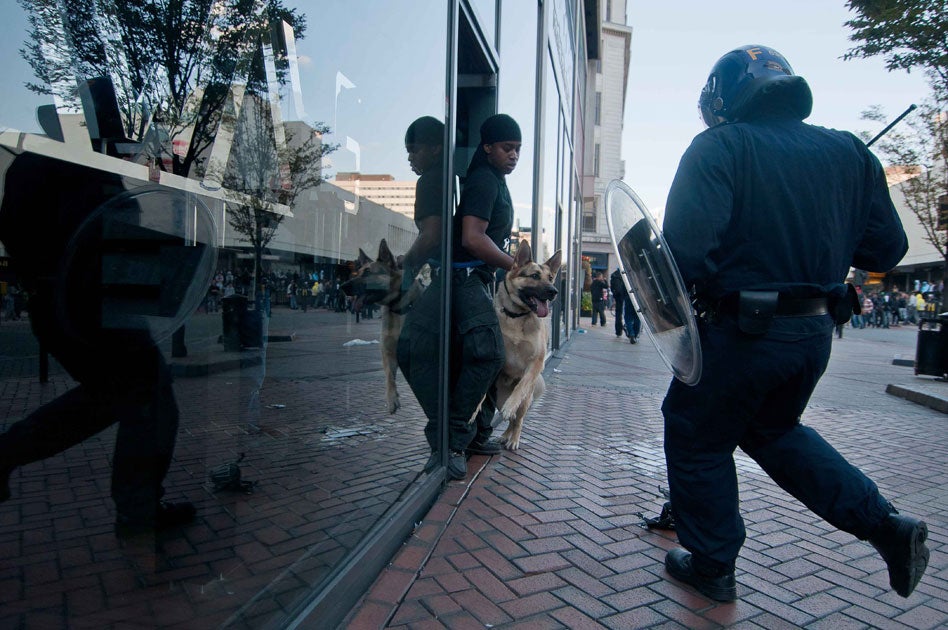Adrian Hamilton: Let's not go the way of Los Angeles

I don't know what they're going to do about this rioting," said a newscaster on a local TV station during the Watts Riots in August 1965, "but I know what I'm going to do." And with that, he pulled a gun from his pocket and laid it on the table before him.
Riots, particularly those with any racial tinge, produce a visceral fear among the middle classes that the underclass will pour out of their ghettos to wreak havoc on their havens. In Los Angeles it was the nightmare vision that the blacks would break out of Watts – an area to which few had ever been as they drove above it on the freeway – to pillage Beverly Hills and the surrounding suburbs.
In London it has been the horror of a city taken over by looters using social networks to move around to wherever there are shops with the goods they covet.
Back then, in the great spate of US urban riots after Watts, there was open talk of war as the rioters were reported to have taken up the cry of "Burn, Baby, Burn". The National Guard was called in. Nervous and untrained, they shot at anyone carrying goods from a shop, including 10-year-old kids.
Here there has been equal talk of calling in the army and if that hasn't happened (nor is likely to) the Prime Minister has still talked of a "fightback under way", as if he were Churchill pronouncing on a German invasion. Vigilante groups have been formed, just as they were in LA, to protect property from arson and robbery. Inter-ethnic tensions were stoked.
In the end, the blacks of Watts never did fan out to invade the white districts. To that extent it wasn't the race riot that everybody at the time feared. After four days, the deaths of 34, over 1,000 injured and 3,438 arrested, a riot which had started with the arrest of a black man for drink driving burned itself out – only for it to be repeated over the next few summers in most of the major cities of the United States.
It's hard to see the violence of the last week across Britain as anything very different. There isn't the same straight racial character to the outbreaks which have occurred in the last few days – although a surprising number of ordinary people seem to believe there is. But all the accusations of "mindless violence", "feral kids" and "social breakdown" – in 1965 the LA police chief didn't improve matters by calling them "monkeys in the zoo" – are pretty much the same. If law and order breaks down, then people take advantage to take what they can. You only have to look at Baghdad after the invasion to see that.
And the rioting tends to exhaust itself when the young have enjoyed the pleasures of destruction and theft, as much as because of the restoration of order by the police. Authorities talk tough. They need to, for their own sake. But most of those participating in these crimes do it for a short burst of elation, rather than any longer term plan for a transfer of wealth.
What does matter are the consequences. The Watts riots led to an intense bout of soul-searching in America and a good deal of action led by President Lyndon Johnson (a good liberal on these matters) to improve conditions for the dispossessed. Some of it did good, although the harsh truth of post-Watts America was that it was drugs which enabled society to ignore the ghettos once more by providing a form of local economic activity and justifying a police clampdown. The gap between rich and poor, meanwhile, went on rising remorselessly. And in Britain? The rhetoric, it has to be said, has so far been almost entirely on the lines of suppression, rather than reconstruction. In all the statements of ministers and the London Mayor, there has been virtually no mention of communities and talking with them, only of cracking down on wrong-doers. Humiliated by the ability of the rioters to circumvent them and appalled by the pictures of open theft on the screen, the government and the police have outdone themselves in talk of tracking down every last perpetrator. A country which always valued property above human life is, one fears, about to take full and relentless revenge, with the Olympic Games used as the excuse – a vainglorious tail that now wags the London dog.
Yet Britain is not nearly as divided, or as frightening, a country as America. Sink estates exist side by side with posher streets. Gated communities are still the exception, rather than the rule. Any reconciliation has to be carried out by building community relations between the underclass and their neighbours. The one advantage that the authorities have now – unless they want to throw it away in an orgy of punishment – is that the local communities are as appalled by what has happened as the Government is.
In Watts, many of the inhabitants, while deploring the motives, sympathised with the frustration. In Britain, where the looters have largely been made up of the young, there is a lot less sympathy.
Only a few weeks ago people were proclaiming the virtues of social networks for the part they were playing in getting protesters out onto the streets of Syria and Egypt. Now they are being condemned for their part in helping organise the looting in Britain.
The contrast between use and purpose could hardly be more depressing.
Join our commenting forum
Join thought-provoking conversations, follow other Independent readers and see their replies
Comments
Bookmark popover
Removed from bookmarks